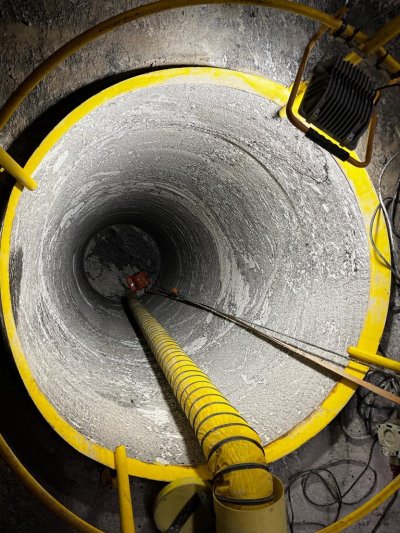 Finland’s radioactive waste management company, Posiva Oy has completed the first two deposition holes at the used fuel disposal facility under construction at Onkalo. Posiva staff used a new DHBM boring machine to drill the holes, which are located at a depth of 430 metres in the deposition tunnel built for the Joint Functional Test (JFT). The first four holes in the tunnel were drilled in the autumn of 2022 as a test drilling operation by a crew from the machine's manufacturer, Herrenknecht AG.
Finland’s radioactive waste management company, Posiva Oy has completed the first two deposition holes at the used fuel disposal facility under construction at Onkalo. Posiva staff used a new DHBM boring machine to drill the holes, which are located at a depth of 430 metres in the deposition tunnel built for the Joint Functional Test (JFT). The first four holes in the tunnel were drilled in the autumn of 2022 as a test drilling operation by a crew from the machine's manufacturer, Herrenknecht AG.
Posiva has been preparing for the disposal of used nuclear fuel for more than 40 years. Its encapsulation plant is located above ground, and the fuel repository of underground disposal facility is located in the bedrock at a depth of approximately 400-430 metres. Posiva has applied for an operating licence to the Ministry of Economic Affairs & Employment. Posiva’s owners — Teollisuuden Voima Oyj’s Olkiluoto NPP and Fortum Power and Heat Oy’s Loviisa NPP — expect to dispose of their used fuel in the facility between 2024 and 2070.
Excavation of the first five final disposal tunnels at Onkalo used was completed in June 2022. The total length of the tunnels is about 1700 metres. Holes for approximately 180 disposal capsules will be drilled in the first five disposal tunnels.
“The drilling of the first holes with the DHBM boring machine operated by our own personnel is a significant step forward as Posiva moves towards the start of operation, said Posiva's Programme Manager Kimmo Kemppainen. “We made several practical observations for production drilling already with these two holes. There were some minor teething problems with a new machine. For example, how to support the machine when the tunnel ceiling does not follow the theoretical tunnel profile. The need for sufficient amount of clean flushing water for the boring machine was also established, so as to avoid sedimentation of rock residue from drilling in the flushing system.”
The drilling of one hole took about six days. Posiva's own crew will drill a total of four holes in the JFT tunnel, bringing the total number of holes in the tunnel to eight. All four holes will be ready by the beginning of March. The Joint Functional Test is scheduled to start in February 2024.
Image: The newest deposition hole drilled by Herrenknecht's DHBM boring machine drying before inspection (courtesy of Posiva)






